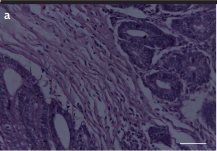Background/Aims: Xylopic acid (XA) has been reported to exhibit analgesic activity, alleviate neuropathic pain in rodents, and demonstrate anti-inflammatory effects. Intrarectal challenge of rats with acetic acid induces colitis that bears resemblance in terms of its pathogenesis, histopathology, and inflammatory profile to that in humans. Reactive oxygen species are implicated as the main driving force in this inflammatory bowel disease. This study aimed to investigate the anti-colitic potential of XA.
Materials and Methods: We investigated the effect of XA on body weight, disease activity, inflammatory cell infiltration, and generation of reactive oxygen species. Rats were treated with XA or sulphasalazine, challenged intrarectally with acetic acid with macroscopic and microscopic findings made after eight days.
Results: Administration of XA to rats with colitis resulted in an increase in body weight with significant (p<0.05) improvement of the disease profile macroscopically. We observed decreased gross mucosal injury, reduced inflammation, and cellular proliferation with XA administration. Treatment with XA also resulted in decreased colonic epithelial expression of argyrophylic nucleolar organizer regions (AgNORs) with significant decrease (p<0.0001) in the quantitative expression of AgNORs/nucleus ratio to levels comparable with non-colitic control. We also observed reduced proliferation of mucosal mast cell in the colonic segment of the rats treated with XA. Treatment with XA also significantly (p<0.0001) increased the activity of SOD, CAT, and APx while it decreased the activity of MPO and MDA levels.
Conclusion: Xylopic acid possesses anti-colitic activity in rats induced with acetic acid colitis.
Cite this article as: Osafo N, Obiri DD, Danquah KO, Essel LB, Antwi AO. Potential effects of xylopic acid on acetic acid-induced ulcerative colitis in rats. Turk J Gastroenterol 2019; 30(8): 732-44.




.png)
.png)
